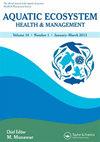昆特湾藻华生态学:组成、多样性和动态
IF 0.8
4区 环境科学与生态学
Q4 ENVIRONMENTAL SCIENCES
引用次数: 7
摘要
在2010年8月、2010年9月和2011年9月对安大略湖昆特湾进行的三次独立调查中,共观察到25次藻华。在这里,我们根据浮游植物生物量的直接测量来定义藻华,而不是叶绿素a等代理测量。在这个慢性富营养化的环境中,我们观察到8个硅藻华(Aulacoseira spp.), 7个蓝藻华(Dolichospermum, Gloeotrichia, Microcystis等)和10多个这两个分类群的混合物。在蓝藻华位点,约50%或更多的总生物量由已知的产毒物种组成。较大的藻类(bbb20 μm和2-20 μm)具有较高的初级产量(40 - 160 mg C m−3 h−1),表明藻华期间(硅藻和蓝藻)的光合作用几乎没有限制。与群落蓝藻相比,丝状藻(硅藻和蓝藻均为bbb9)的生物量商数的生产力要高得多(<5),这表明丝状藻的光合效率更高。结果表明,观察到的藻华具有多样性和动态性;管理策略需要认识到个体开花事件的独特特征。此外,长期的研究和监测计划对于适应性管理策略的应用是必要的,以解决持续的生态系统压力,如富营养化。本文章由计算机程序翻译,如有差异,请以英文原文为准。
Ecology of algal blooms in the Bay of Quinte: composition, diversity and dynamics
A total of 25 algal blooms were observed during three separate surveys of the Bay of Quinte, Lake Ontario, conducted during August 2010, September 2010 and September 2011. Here we define algal blooms based on the direct measurement of phytoplankton biomass (>3 g m−3) and not proxy measures such as chlorophyll a. In this chronically eutrophic embayment, we observed 8 diatom blooms (Aulacoseira spp.), 7 cyanobacteria blooms (Dolichospermum, Gloeotrichia, Microcystis, etc.) and 10 more that were mixtures of both taxa. At the cyano-bloom sites, ≈50% or more of the total biomass was composed of species known to be toxigenic. High rates of primary production (40 – 160 mg C m−3 h−1) by the larger algal size classes (>20 μm and 2–20 μm) indicated that there were few constraints on photosynthesis during bloom events (both diatom and cyanobacteria). Productivity to biomass quotients were considerably higher for filamentous algal forms (>9 for both diatoms and cyanobacteria) compared to colonial cyanobacteria (<5) suggesting that filamentous algae are more photosynthetically efficient. Our findings showed the observed algal blooms to be diverse and dynamic entities; management strategies need to recognize the unique characteristics of individual bloom events. Moreover, long term research and monitoring programs are necessary for the application of adaptive management strategies in order to address persistent ecosystem stressors like eutrophication.
求助全文
通过发布文献求助,成功后即可免费获取论文全文。
去求助
来源期刊

Aquatic Ecosystem Health & Management
环境科学-海洋与淡水生物学
CiteScore
1.70
自引率
0.00%
发文量
1
审稿时长
18-36 weeks
期刊介绍:
The journal publishes articles on the following themes and topics:
• Original articles focusing on ecosystem-based sciences, ecosystem health and management of marine and aquatic ecosystems
• Reviews, invited perspectives and keynote contributions from conferences
• Special issues on important emerging topics, themes, and ecosystems (climate change, invasive species, HABs, risk assessment, models)
 求助内容:
求助内容: 应助结果提醒方式:
应助结果提醒方式:


